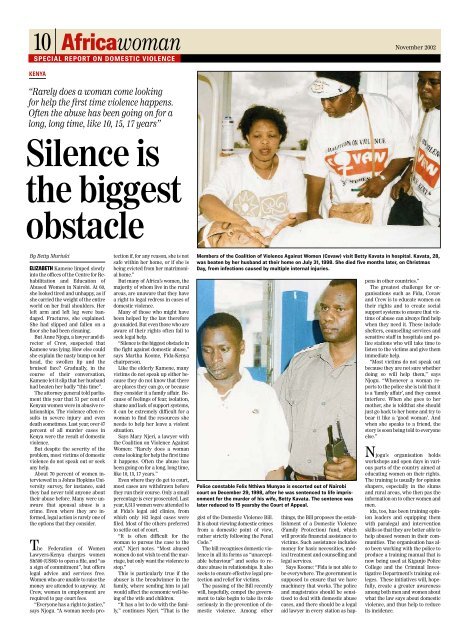Issue 7 - Domestic Violence - ColdType
Issue 7 - Domestic Violence - ColdType
Issue 7 - Domestic Violence - ColdType
Create successful ePaper yourself
Turn your PDF publications into a flip-book with our unique Google optimized e-Paper software.
10 Africawoman November<br />
SPECIAL REPORT ON DOMESTIC VIOLENCE<br />
KENYA<br />
“Rarely does a woman come looking<br />
for help the first time violence happens.<br />
Often the abuse has been going on for a<br />
long, long time, like 10, 15, 17 years”<br />
Silence is<br />
the biggest<br />
obstacle<br />
By Betty Muriuki<br />
ELIZABETH Kamene limped slowly<br />
into the offices of the Centre for Rehabilitation<br />
and Education of<br />
Abused Women in Nairobi. At 60,<br />
she looked tired and unhappy, as if<br />
she carried the weight of the entire<br />
world on her frail shoulders. Her<br />
left arm and left leg were bandaged.<br />
Fractures, she explained.<br />
She had slipped and fallen on a<br />
floor she had been cleaning.<br />
But Anne Njogu, a lawyer and director<br />
of Crew, suspected that<br />
Kamene was lying. How else could<br />
she explain the nasty bump on her<br />
head, the swollen lip and the<br />
bruised face? Gradually, in the<br />
course of their conversation,<br />
Kamene let it slip that her husband<br />
had beaten her badly “this time”.<br />
The attorney general told parliament<br />
this year that 51 per cent of<br />
Kenyan women were in abusive relationships.<br />
The violence often results<br />
in severe injury and even<br />
death sometimes. Last year, over 47<br />
percent of all murder cases in<br />
Kenya were the result of domestic<br />
violence.<br />
But despite the severity of the<br />
problem, most victims of domestic<br />
violence do not speak out or seek<br />
any help.<br />
About 70 percent of women interviewed<br />
in a Johns Hopkins University<br />
survey, for instance, said<br />
they had never told anyone about<br />
their abuse before. Many were unaware<br />
that spousal abuse is a<br />
crime. Even where they are informed,<br />
legal action is rarely one of<br />
the options that they consider.<br />
The Federation of Women<br />
Lawyers-Kenya charges women<br />
Sh500 (US$6) to open a file, and “as<br />
a sign of commitment”, but offers<br />
legal advice and services free.<br />
Women who are unable to raise the<br />
money are attended to anyway. At<br />
Crew, women in employment are<br />
required to pay court fees.<br />
“Everyone has a right to justice,”<br />
says Njogu. “A woman needs pro-<br />
tection if, for any reason, she is not<br />
safe within her home, or if she is<br />
being evicted from her matrimonial<br />
home.”<br />
But many of Africa’s women, the<br />
majority of whom live in the rural<br />
areas, are unaware that they have<br />
a right to legal redress in cases of<br />
domestic violence.<br />
Many of those who might have<br />
been helped by the law therefore<br />
go unaided. But even those who are<br />
aware of their rights often fail to<br />
seek legal help.<br />
“Silence is the biggest obstacle in<br />
the fight against domestic abuse,”<br />
says Martha Koome, Fida-Kenya<br />
chairperson.<br />
Like the elderly Kamene, many<br />
victims do not speak up either because<br />
they do not know that there<br />
are places they can go, or because<br />
they consider it a family affair. Because<br />
of feelings of fear, isolation,<br />
shame and lack of support systems,<br />
it can be extremely difficult for a<br />
woman to find the resources she<br />
needs to help her leave a violent<br />
situation.<br />
Says Mary Njeri, a lawyer with<br />
the Coalition on <strong>Violence</strong> Against<br />
Women: “Rarely does a woman<br />
come looking for help the first time<br />
it happens. Often the abuse has<br />
been going on for a long, long time,<br />
like 10, 15, 17 years.”<br />
Even where they do get to court,<br />
most cases are withdrawn before<br />
they run their course. Only a small<br />
percentage is ever prosecuted. Last<br />
year, 8,313 women were attended to<br />
at Fida’s legal aid clinics, from<br />
which only 162 legal cases were<br />
filed. Most of the others preferred<br />
to settle out of court.<br />
“It is often difficult for the<br />
woman to pursue the case to the<br />
end,” Njeri notes. “Most abused<br />
women do not wish to end the marriage,<br />
but only want the violence to<br />
stop.”<br />
This is particularly true if the<br />
abuser is the breadwinner in the<br />
family, where sending him to jail<br />
would affect the economic well-being<br />
of the wife and children.<br />
“It has a lot to do with the family,”<br />
continues Njeri. “That is the<br />
Members of the Coalition of <strong>Violence</strong> Against Women (Covaw) visit Betty Kavata in hospital. Kavata, 28,<br />
was beaten by her husband at their home on July 31, 1998. She died five months later, on Christmas<br />
Day, from infections caused by multiple internal injuries.<br />
Police constable Felix Nthiwa Munyao is escorted out of Nairobi<br />
court on December 29, 1998, after he was sentenced to life imprisonment<br />
for the murder of his wife, Betty Kavata. The sentence was<br />
later reduced to 15 yearsby the Court of Appeal.<br />
gist of the <strong>Domestic</strong> <strong>Violence</strong> Bill.<br />
It is about viewing domestic crimes<br />
from a domestic point of view,<br />
rather strictly following the Penal<br />
Code.”<br />
The bill recognises domestic violence<br />
in all its forms as “unacceptable<br />
behaviour” and seeks to reduce<br />
abuse in relationships. It also<br />
seeks to ensure effective legal protection<br />
and relief for victims.<br />
The passing of the Bill recently<br />
will, hopefully, compel the government<br />
to take begin to take its role<br />
seriously in the prevention of domestic<br />
violence. Among other<br />
things, the Bill proposes the establishment<br />
of a <strong>Domestic</strong> <strong>Violence</strong><br />
(Family Protection) fund, which<br />
will provide financial assistance to<br />
victims. Such assistance includes<br />
money for basic necessities, medical<br />
treatment and counselling and<br />
legal services.<br />
Says Koome: “Fida is not able to<br />
be everywhere. The government is<br />
supposed to ensure that we have<br />
machinery that works. The police<br />
and magistrates should be sensitised<br />
to deal with domestic abuse<br />
cases, and there should be a legal<br />
aid lawyer in every station as hap-<br />
2002<br />
pens in other countries.”<br />
The greatest challenge for organisations<br />
such as Fida, Covaw<br />
and Crew is to educate women on<br />
their rights and to create social<br />
support systems to ensure that victims<br />
of abuse can always find help<br />
when they need it. These include<br />
shelters, counselling services and<br />
sensitive staff in hospitals and police<br />
stations who will take time to<br />
listen to the victims and give them<br />
immediate help.<br />
“Most victims do not speak out<br />
because they are not sure whether<br />
doing so will help them,” says<br />
Njogu. “Whenever a woman reports<br />
to the police she is told that it<br />
is a ‘family affair’, and they cannot<br />
interfere. When she goes to her<br />
mother, she is toldthat she should<br />
just go back to her home and try to<br />
bear it like a ‘good woman’. And<br />
when she speaks to a friend, the<br />
story is soon being told to everyone<br />
else.”<br />
Njogu’s organisation holds<br />
workshops and open days in various<br />
parts of the country aimed at<br />
educating women on their rights.<br />
The training is usually for opinion<br />
shapers, especially in the slums<br />
and rural areas, who then pas the<br />
information on to other women and<br />
men.<br />
ida, too, has been training opinion<br />
leaders and equipping them<br />
with paralegal and intervention<br />
skills so that they are better able to<br />
help abused women in their communities.<br />
The organisation has also<br />
been working with the police to<br />
produce a training manual that is<br />
now being used at Kiganjo Police<br />
College and the Criminal Investigative<br />
Department’s training colleges.<br />
These initiatives will, hopefully,<br />
create a greater awareness<br />
among both men and women about<br />
what the law says about domestic<br />
violence, and thus help to reduce<br />
its incidence.
















